A Marxist Reading of Nikolai Ostrovsky's How the Steel was Tempered
VerifiedAdded on 2023/06/03
|14
|4366
|291
AI Summary
This paper analyzes Nikolai Ostrovsky's How the Steel was Tempered from a Marxist perspective, discussing inequality between classes, anti-capitalism attitude, and class conflicts. The novel is a famous example of Socialist Realism as it is infused with the ideology of socialism. The paper makes an analysis of Marxism in the novel and how Marxist theories are applied in the novel.
Contribute Materials
Your contribution can guide someone’s learning journey. Share your
documents today.
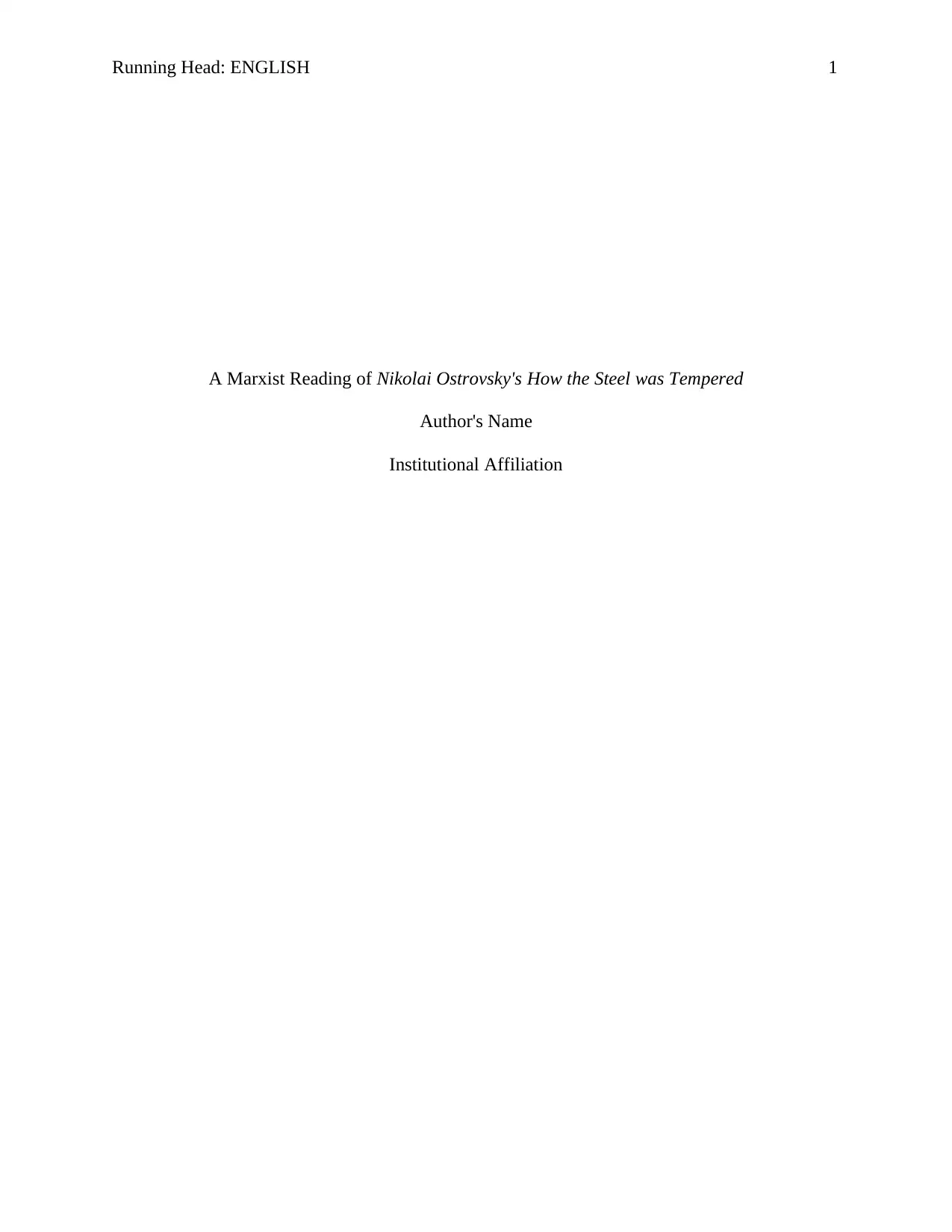
Running Head: ENGLISH 1
A Marxist Reading of Nikolai Ostrovsky's How the Steel was Tempered
Author's Name
Institutional Affiliation
A Marxist Reading of Nikolai Ostrovsky's How the Steel was Tempered
Author's Name
Institutional Affiliation
Secure Best Marks with AI Grader
Need help grading? Try our AI Grader for instant feedback on your assignments.
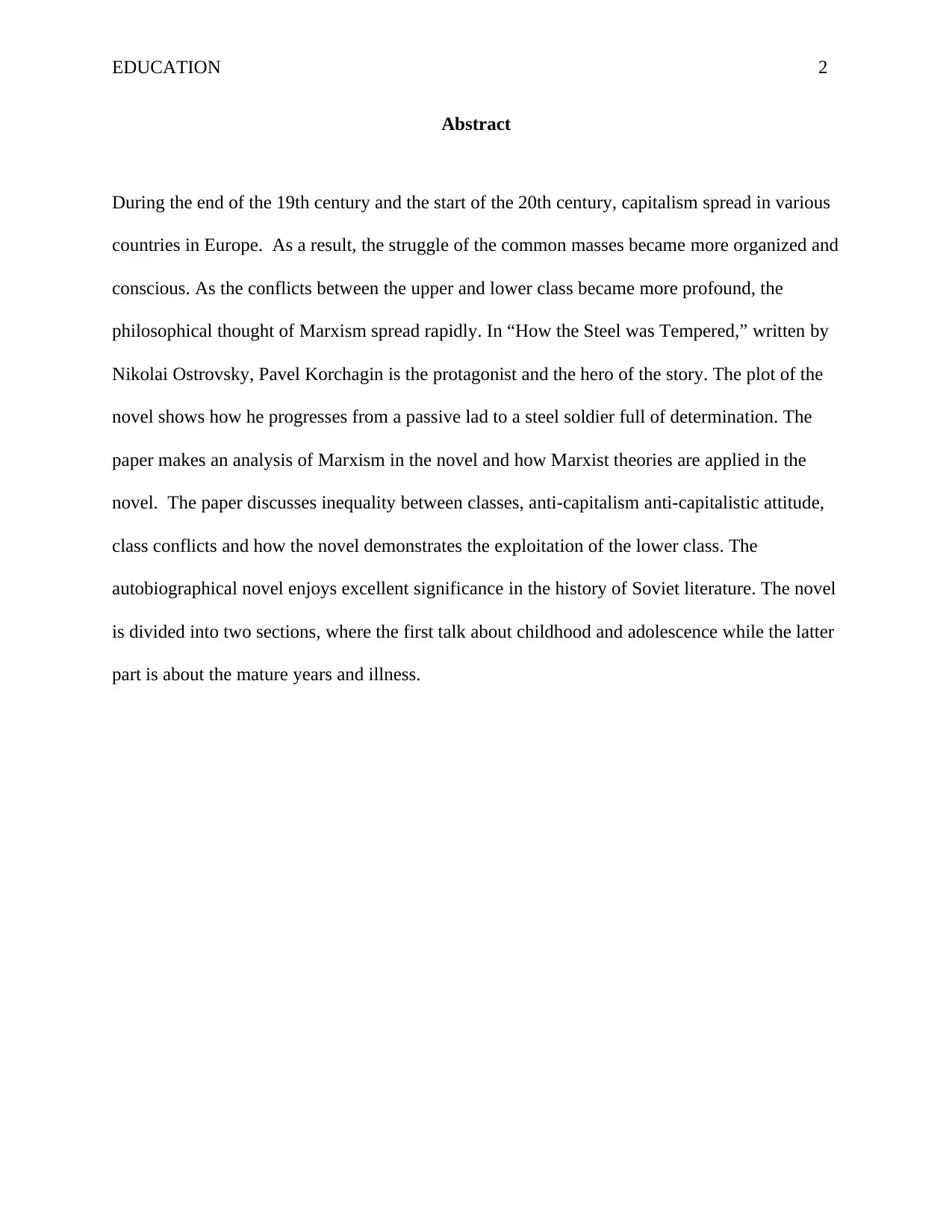
EDUCATION 2
Abstract
During the end of the 19th century and the start of the 20th century, capitalism spread in various
countries in Europe. As a result, the struggle of the common masses became more organized and
conscious. As the conflicts between the upper and lower class became more profound, the
philosophical thought of Marxism spread rapidly. In “How the Steel was Tempered,” written by
Nikolai Ostrovsky, Pavel Korchagin is the protagonist and the hero of the story. The plot of the
novel shows how he progresses from a passive lad to a steel soldier full of determination. The
paper makes an analysis of Marxism in the novel and how Marxist theories are applied in the
novel. The paper discusses inequality between classes, anti-capitalism anti-capitalistic attitude,
class conflicts and how the novel demonstrates the exploitation of the lower class. The
autobiographical novel enjoys excellent significance in the history of Soviet literature. The novel
is divided into two sections, where the first talk about childhood and adolescence while the latter
part is about the mature years and illness.
Abstract
During the end of the 19th century and the start of the 20th century, capitalism spread in various
countries in Europe. As a result, the struggle of the common masses became more organized and
conscious. As the conflicts between the upper and lower class became more profound, the
philosophical thought of Marxism spread rapidly. In “How the Steel was Tempered,” written by
Nikolai Ostrovsky, Pavel Korchagin is the protagonist and the hero of the story. The plot of the
novel shows how he progresses from a passive lad to a steel soldier full of determination. The
paper makes an analysis of Marxism in the novel and how Marxist theories are applied in the
novel. The paper discusses inequality between classes, anti-capitalism anti-capitalistic attitude,
class conflicts and how the novel demonstrates the exploitation of the lower class. The
autobiographical novel enjoys excellent significance in the history of Soviet literature. The novel
is divided into two sections, where the first talk about childhood and adolescence while the latter
part is about the mature years and illness.
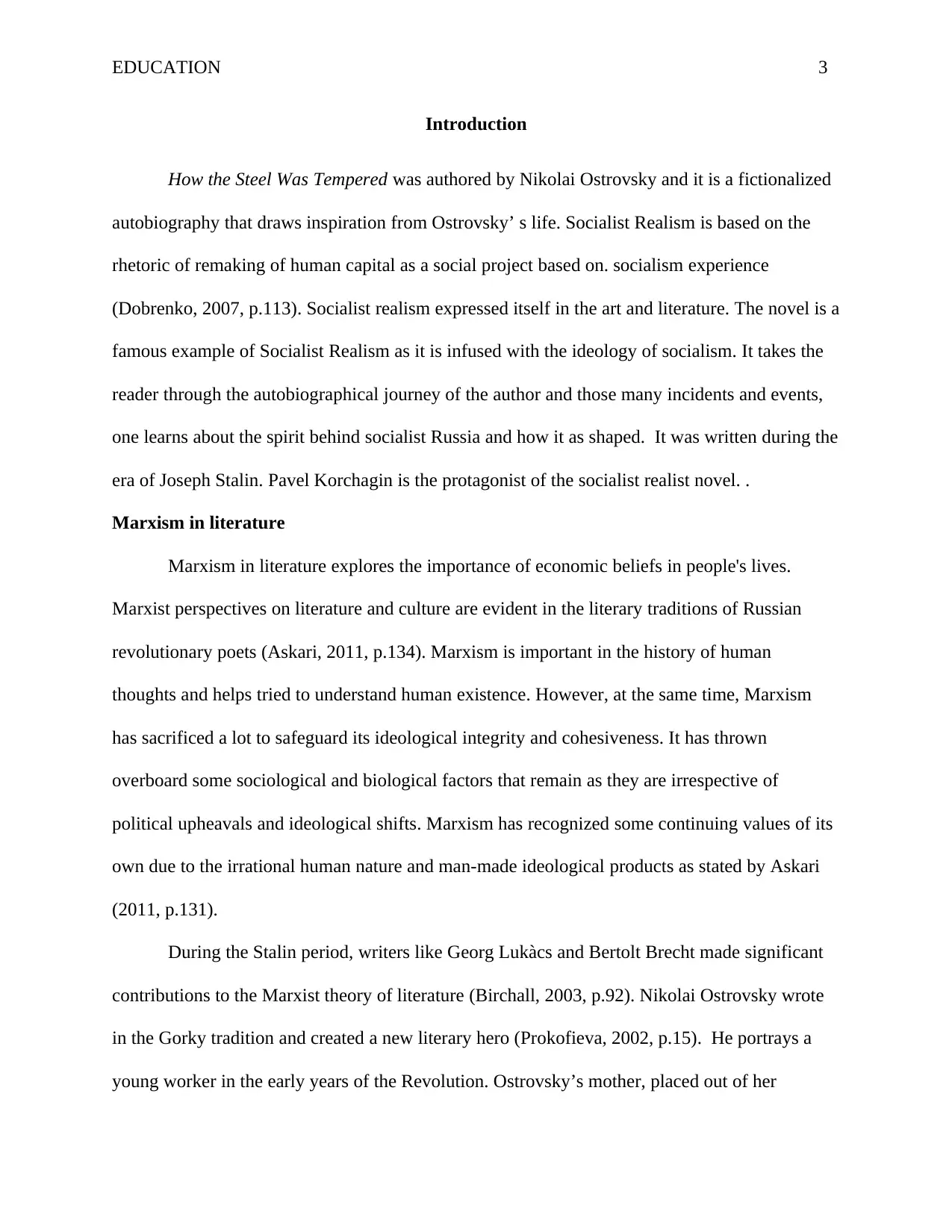
EDUCATION 3
Introduction
How the Steel Was Tempered was authored by Nikolai Ostrovsky and it is a fictionalized
autobiography that draws inspiration from Ostrovsky’ s life. Socialist Realism is based on the
rhetoric of remaking of human capital as a social project based on. socialism experience
(Dobrenko, 2007, p.113). Socialist realism expressed itself in the art and literature. The novel is a
famous example of Socialist Realism as it is infused with the ideology of socialism. It takes the
reader through the autobiographical journey of the author and those many incidents and events,
one learns about the spirit behind socialist Russia and how it as shaped. It was written during the
era of Joseph Stalin. Pavel Korchagin is the protagonist of the socialist realist novel. .
Marxism in literature
Marxism in literature explores the importance of economic beliefs in people's lives.
Marxist perspectives on literature and culture are evident in the literary traditions of Russian
revolutionary poets (Askari, 2011, p.134). Marxism is important in the history of human
thoughts and helps tried to understand human existence. However, at the same time, Marxism
has sacrificed a lot to safeguard its ideological integrity and cohesiveness. It has thrown
overboard some sociological and biological factors that remain as they are irrespective of
political upheavals and ideological shifts. Marxism has recognized some continuing values of its
own due to the irrational human nature and man-made ideological products as stated by Askari
(2011, p.131).
During the Stalin period, writers like Georg Lukàcs and Bertolt Brecht made significant
contributions to the Marxist theory of literature (Birchall, 2003, p.92). Nikolai Ostrovsky wrote
in the Gorky tradition and created a new literary hero (Prokofieva, 2002, p.15). He portrays a
young worker in the early years of the Revolution. Ostrovsky’s mother, placed out of her
Introduction
How the Steel Was Tempered was authored by Nikolai Ostrovsky and it is a fictionalized
autobiography that draws inspiration from Ostrovsky’ s life. Socialist Realism is based on the
rhetoric of remaking of human capital as a social project based on. socialism experience
(Dobrenko, 2007, p.113). Socialist realism expressed itself in the art and literature. The novel is a
famous example of Socialist Realism as it is infused with the ideology of socialism. It takes the
reader through the autobiographical journey of the author and those many incidents and events,
one learns about the spirit behind socialist Russia and how it as shaped. It was written during the
era of Joseph Stalin. Pavel Korchagin is the protagonist of the socialist realist novel. .
Marxism in literature
Marxism in literature explores the importance of economic beliefs in people's lives.
Marxist perspectives on literature and culture are evident in the literary traditions of Russian
revolutionary poets (Askari, 2011, p.134). Marxism is important in the history of human
thoughts and helps tried to understand human existence. However, at the same time, Marxism
has sacrificed a lot to safeguard its ideological integrity and cohesiveness. It has thrown
overboard some sociological and biological factors that remain as they are irrespective of
political upheavals and ideological shifts. Marxism has recognized some continuing values of its
own due to the irrational human nature and man-made ideological products as stated by Askari
(2011, p.131).
During the Stalin period, writers like Georg Lukàcs and Bertolt Brecht made significant
contributions to the Marxist theory of literature (Birchall, 2003, p.92). Nikolai Ostrovsky wrote
in the Gorky tradition and created a new literary hero (Prokofieva, 2002, p.15). He portrays a
young worker in the early years of the Revolution. Ostrovsky’s mother, placed out of her
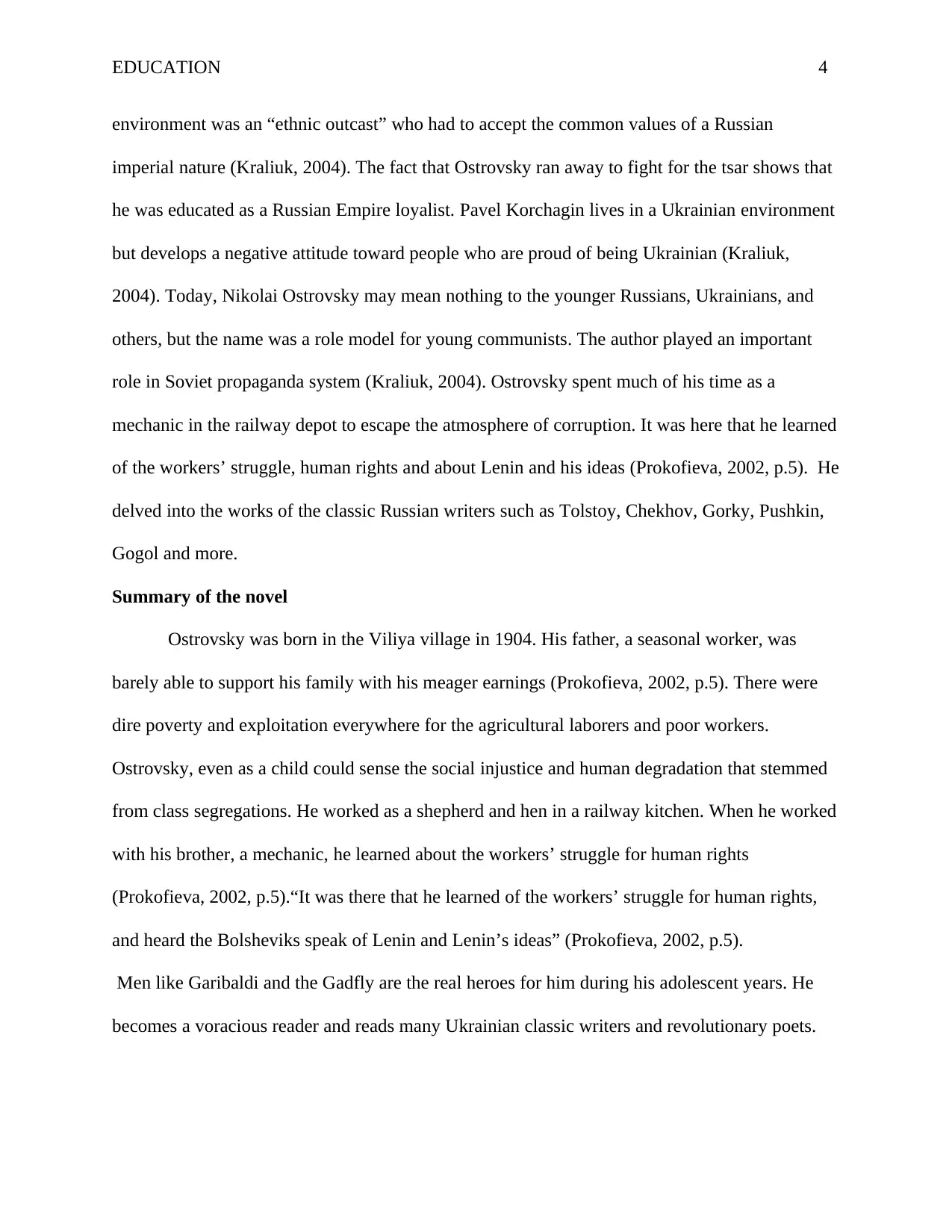
EDUCATION 4
environment was an “ethnic outcast” who had to accept the common values of a Russian
imperial nature (Kraliuk, 2004). The fact that Ostrovsky ran away to fight for the tsar shows that
he was educated as a Russian Empire loyalist. Pavel Korchagin lives in a Ukrainian environment
but develops a negative attitude toward people who are proud of being Ukrainian (Kraliuk,
2004). Today, Nikolai Ostrovsky may mean nothing to the younger Russians, Ukrainians, and
others, but the name was a role model for young communists. The author played an important
role in Soviet propaganda system (Kraliuk, 2004). Ostrovsky spent much of his time as a
mechanic in the railway depot to escape the atmosphere of corruption. It was here that he learned
of the workers’ struggle, human rights and about Lenin and his ideas (Prokofieva, 2002, p.5). He
delved into the works of the classic Russian writers such as Tolstoy, Chekhov, Gorky, Pushkin,
Gogol and more.
Summary of the novel
Ostrovsky was born in the Viliya village in 1904. His father, a seasonal worker, was
barely able to support his family with his meager earnings (Prokofieva, 2002, p.5). There were
dire poverty and exploitation everywhere for the agricultural laborers and poor workers.
Ostrovsky, even as a child could sense the social injustice and human degradation that stemmed
from class segregations. He worked as a shepherd and hen in a railway kitchen. When he worked
with his brother, a mechanic, he learned about the workers’ struggle for human rights
(Prokofieva, 2002, p.5).“It was there that he learned of the workers’ struggle for human rights,
and heard the Bolsheviks speak of Lenin and Lenin’s ideas” (Prokofieva, 2002, p.5).
Men like Garibaldi and the Gadfly are the real heroes for him during his adolescent years. He
becomes a voracious reader and reads many Ukrainian classic writers and revolutionary poets.
environment was an “ethnic outcast” who had to accept the common values of a Russian
imperial nature (Kraliuk, 2004). The fact that Ostrovsky ran away to fight for the tsar shows that
he was educated as a Russian Empire loyalist. Pavel Korchagin lives in a Ukrainian environment
but develops a negative attitude toward people who are proud of being Ukrainian (Kraliuk,
2004). Today, Nikolai Ostrovsky may mean nothing to the younger Russians, Ukrainians, and
others, but the name was a role model for young communists. The author played an important
role in Soviet propaganda system (Kraliuk, 2004). Ostrovsky spent much of his time as a
mechanic in the railway depot to escape the atmosphere of corruption. It was here that he learned
of the workers’ struggle, human rights and about Lenin and his ideas (Prokofieva, 2002, p.5). He
delved into the works of the classic Russian writers such as Tolstoy, Chekhov, Gorky, Pushkin,
Gogol and more.
Summary of the novel
Ostrovsky was born in the Viliya village in 1904. His father, a seasonal worker, was
barely able to support his family with his meager earnings (Prokofieva, 2002, p.5). There were
dire poverty and exploitation everywhere for the agricultural laborers and poor workers.
Ostrovsky, even as a child could sense the social injustice and human degradation that stemmed
from class segregations. He worked as a shepherd and hen in a railway kitchen. When he worked
with his brother, a mechanic, he learned about the workers’ struggle for human rights
(Prokofieva, 2002, p.5).“It was there that he learned of the workers’ struggle for human rights,
and heard the Bolsheviks speak of Lenin and Lenin’s ideas” (Prokofieva, 2002, p.5).
Men like Garibaldi and the Gadfly are the real heroes for him during his adolescent years. He
becomes a voracious reader and reads many Ukrainian classic writers and revolutionary poets.
Secure Best Marks with AI Grader
Need help grading? Try our AI Grader for instant feedback on your assignments.
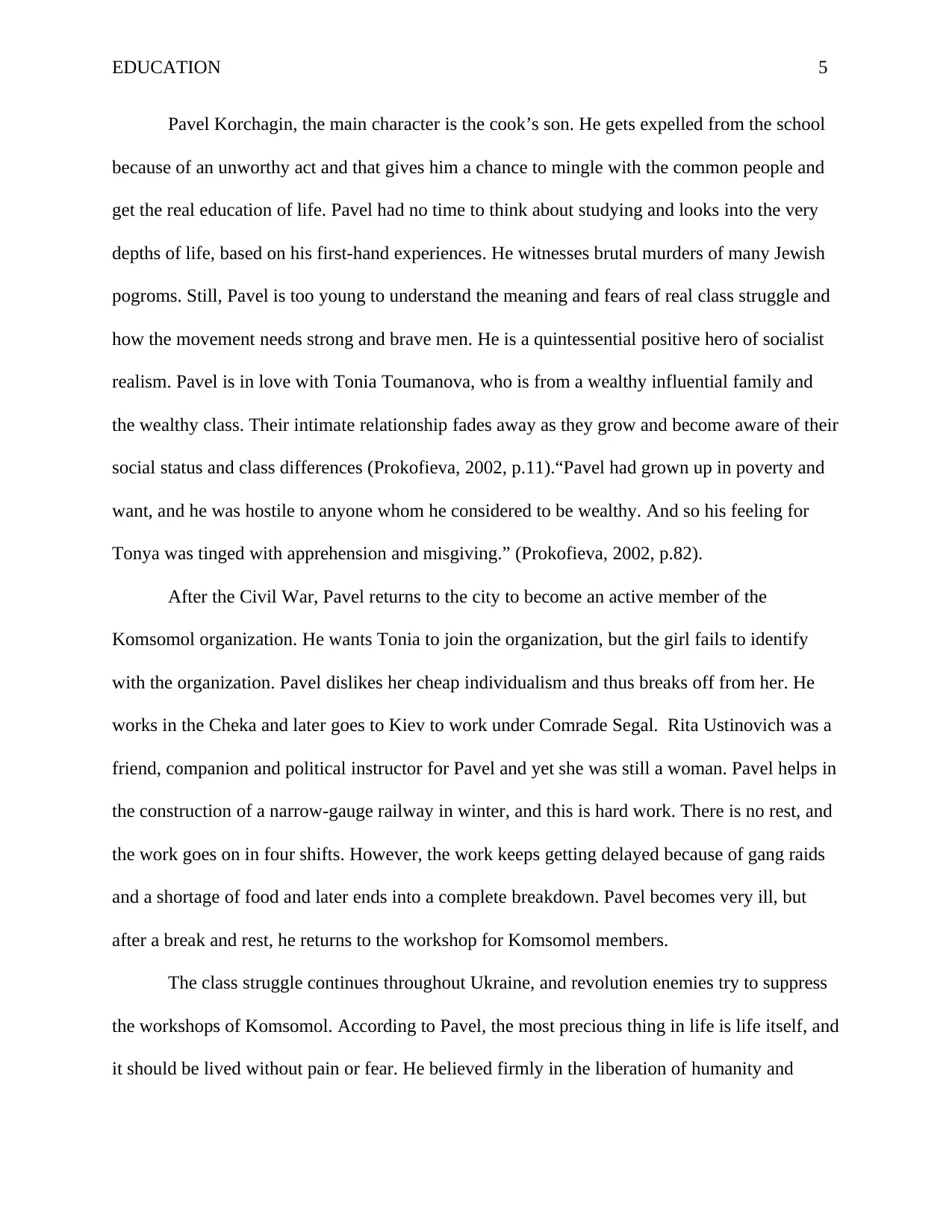
EDUCATION 5
Pavel Korchagin, the main character is the cook’s son. He gets expelled from the school
because of an unworthy act and that gives him a chance to mingle with the common people and
get the real education of life. Pavel had no time to think about studying and looks into the very
depths of life, based on his first-hand experiences. He witnesses brutal murders of many Jewish
pogroms. Still, Pavel is too young to understand the meaning and fears of real class struggle and
how the movement needs strong and brave men. He is a quintessential positive hero of socialist
realism. Pavel is in love with Tonia Toumanova, who is from a wealthy influential family and
the wealthy class. Their intimate relationship fades away as they grow and become aware of their
social status and class differences (Prokofieva, 2002, p.11).“Pavel had grown up in poverty and
want, and he was hostile to anyone whom he considered to be wealthy. And so his feeling for
Tonya was tinged with apprehension and misgiving.” (Prokofieva, 2002, p.82).
After the Civil War, Pavel returns to the city to become an active member of the
Komsomol organization. He wants Tonia to join the organization, but the girl fails to identify
with the organization. Pavel dislikes her cheap individualism and thus breaks off from her. He
works in the Cheka and later goes to Kiev to work under Comrade Segal. Rita Ustinovich was a
friend, companion and political instructor for Pavel and yet she was still a woman. Pavel helps in
the construction of a narrow-gauge railway in winter, and this is hard work. There is no rest, and
the work goes on in four shifts. However, the work keeps getting delayed because of gang raids
and a shortage of food and later ends into a complete breakdown. Pavel becomes very ill, but
after a break and rest, he returns to the workshop for Komsomol members.
The class struggle continues throughout Ukraine, and revolution enemies try to suppress
the workshops of Komsomol. According to Pavel, the most precious thing in life is life itself, and
it should be lived without pain or fear. He believed firmly in the liberation of humanity and
Pavel Korchagin, the main character is the cook’s son. He gets expelled from the school
because of an unworthy act and that gives him a chance to mingle with the common people and
get the real education of life. Pavel had no time to think about studying and looks into the very
depths of life, based on his first-hand experiences. He witnesses brutal murders of many Jewish
pogroms. Still, Pavel is too young to understand the meaning and fears of real class struggle and
how the movement needs strong and brave men. He is a quintessential positive hero of socialist
realism. Pavel is in love with Tonia Toumanova, who is from a wealthy influential family and
the wealthy class. Their intimate relationship fades away as they grow and become aware of their
social status and class differences (Prokofieva, 2002, p.11).“Pavel had grown up in poverty and
want, and he was hostile to anyone whom he considered to be wealthy. And so his feeling for
Tonya was tinged with apprehension and misgiving.” (Prokofieva, 2002, p.82).
After the Civil War, Pavel returns to the city to become an active member of the
Komsomol organization. He wants Tonia to join the organization, but the girl fails to identify
with the organization. Pavel dislikes her cheap individualism and thus breaks off from her. He
works in the Cheka and later goes to Kiev to work under Comrade Segal. Rita Ustinovich was a
friend, companion and political instructor for Pavel and yet she was still a woman. Pavel helps in
the construction of a narrow-gauge railway in winter, and this is hard work. There is no rest, and
the work goes on in four shifts. However, the work keeps getting delayed because of gang raids
and a shortage of food and later ends into a complete breakdown. Pavel becomes very ill, but
after a break and rest, he returns to the workshop for Komsomol members.
The class struggle continues throughout Ukraine, and revolution enemies try to suppress
the workshops of Komsomol. According to Pavel, the most precious thing in life is life itself, and
it should be lived without pain or fear. He believed firmly in the liberation of humanity and
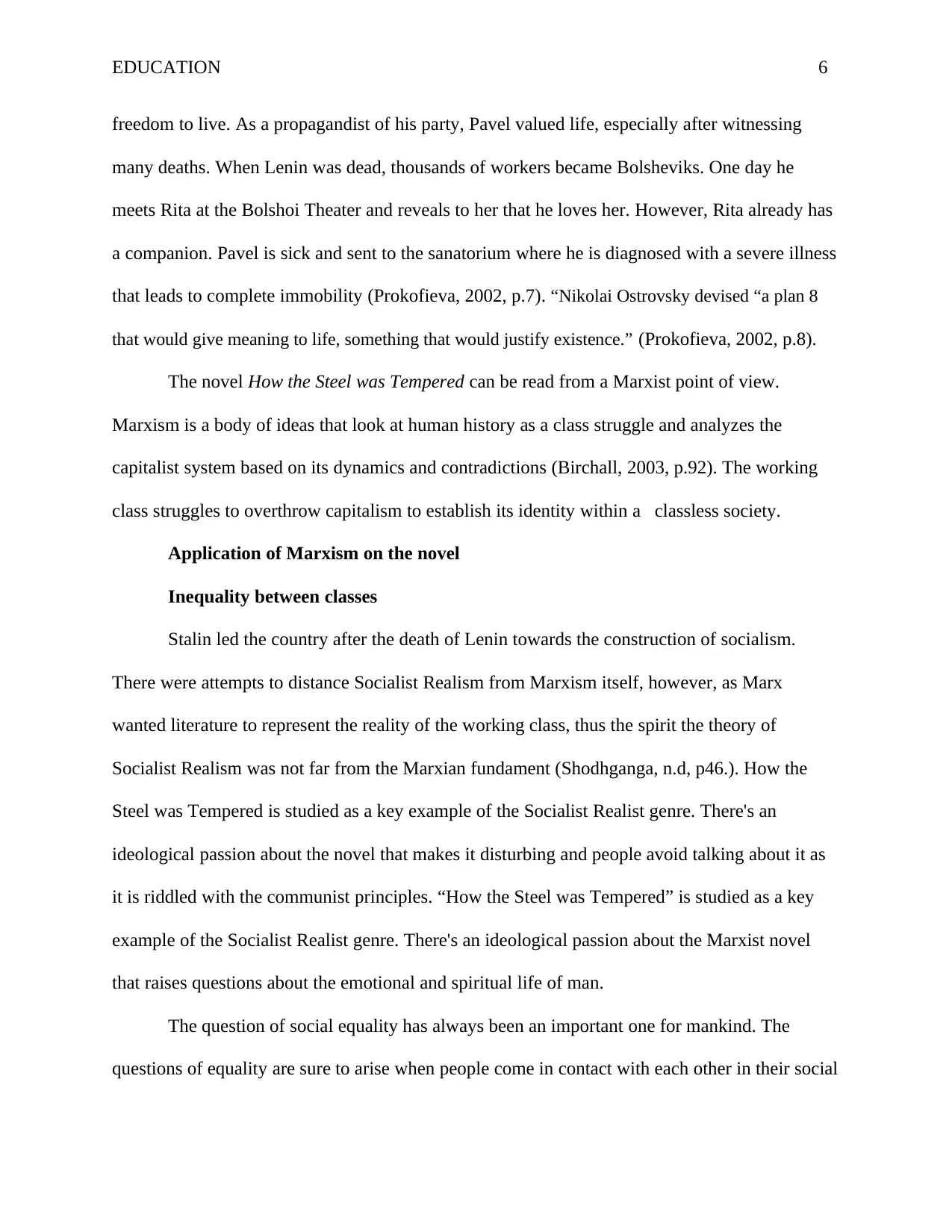
EDUCATION 6
freedom to live. As a propagandist of his party, Pavel valued life, especially after witnessing
many deaths. When Lenin was dead, thousands of workers became Bolsheviks. One day he
meets Rita at the Bolshoi Theater and reveals to her that he loves her. However, Rita already has
a companion. Pavel is sick and sent to the sanatorium where he is diagnosed with a severe illness
that leads to complete immobility (Prokofieva, 2002, p.7). “Nikolai Ostrovsky devised “a plan 8
that would give meaning to life, something that would justify existence.” (Prokofieva, 2002, p.8).
The novel How the Steel was Tempered can be read from a Marxist point of view.
Marxism is a body of ideas that look at human history as a class struggle and analyzes the
capitalist system based on its dynamics and contradictions (Birchall, 2003, p.92). The working
class struggles to overthrow capitalism to establish its identity within a classless society.
Application of Marxism on the novel
Inequality between classes
Stalin led the country after the death of Lenin towards the construction of socialism.
There were attempts to distance Socialist Realism from Marxism itself, however, as Marx
wanted literature to represent the reality of the working class, thus the spirit the theory of
Socialist Realism was not far from the Marxian fundament (Shodhganga, n.d, p46.). How the
Steel was Tempered is studied as a key example of the Socialist Realist genre. There's an
ideological passion about the novel that makes it disturbing and people avoid talking about it as
it is riddled with the communist principles. “How the Steel was Tempered” is studied as a key
example of the Socialist Realist genre. There's an ideological passion about the Marxist novel
that raises questions about the emotional and spiritual life of man.
The question of social equality has always been an important one for mankind. The
questions of equality are sure to arise when people come in contact with each other in their social
freedom to live. As a propagandist of his party, Pavel valued life, especially after witnessing
many deaths. When Lenin was dead, thousands of workers became Bolsheviks. One day he
meets Rita at the Bolshoi Theater and reveals to her that he loves her. However, Rita already has
a companion. Pavel is sick and sent to the sanatorium where he is diagnosed with a severe illness
that leads to complete immobility (Prokofieva, 2002, p.7). “Nikolai Ostrovsky devised “a plan 8
that would give meaning to life, something that would justify existence.” (Prokofieva, 2002, p.8).
The novel How the Steel was Tempered can be read from a Marxist point of view.
Marxism is a body of ideas that look at human history as a class struggle and analyzes the
capitalist system based on its dynamics and contradictions (Birchall, 2003, p.92). The working
class struggles to overthrow capitalism to establish its identity within a classless society.
Application of Marxism on the novel
Inequality between classes
Stalin led the country after the death of Lenin towards the construction of socialism.
There were attempts to distance Socialist Realism from Marxism itself, however, as Marx
wanted literature to represent the reality of the working class, thus the spirit the theory of
Socialist Realism was not far from the Marxian fundament (Shodhganga, n.d, p46.). How the
Steel was Tempered is studied as a key example of the Socialist Realist genre. There's an
ideological passion about the novel that makes it disturbing and people avoid talking about it as
it is riddled with the communist principles. “How the Steel was Tempered” is studied as a key
example of the Socialist Realist genre. There's an ideological passion about the Marxist novel
that raises questions about the emotional and spiritual life of man.
The question of social equality has always been an important one for mankind. The
questions of equality are sure to arise when people come in contact with each other in their social
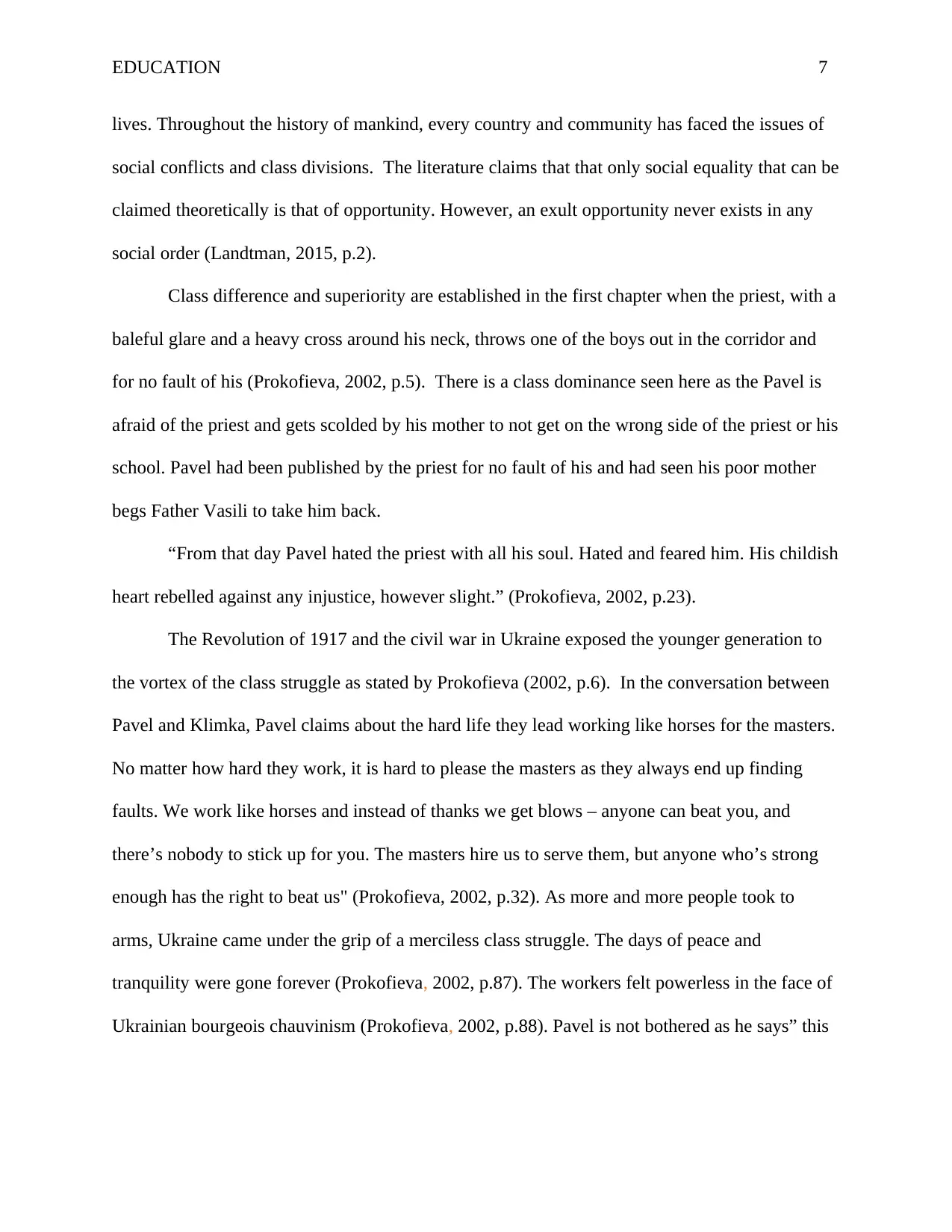
EDUCATION 7
lives. Throughout the history of mankind, every country and community has faced the issues of
social conflicts and class divisions. The literature claims that that only social equality that can be
claimed theoretically is that of opportunity. However, an exult opportunity never exists in any
social order (Landtman, 2015, p.2).
Class difference and superiority are established in the first chapter when the priest, with a
baleful glare and a heavy cross around his neck, throws one of the boys out in the corridor and
for no fault of his (Prokofieva, 2002, p.5). There is a class dominance seen here as the Pavel is
afraid of the priest and gets scolded by his mother to not get on the wrong side of the priest or his
school. Pavel had been published by the priest for no fault of his and had seen his poor mother
begs Father Vasili to take him back.
“From that day Pavel hated the priest with all his soul. Hated and feared him. His childish
heart rebelled against any injustice, however slight.” (Prokofieva, 2002, p.23).
The Revolution of 1917 and the civil war in Ukraine exposed the younger generation to
the vortex of the class struggle as stated by Prokofieva (2002, p.6). In the conversation between
Pavel and Klimka, Pavel claims about the hard life they lead working like horses for the masters.
No matter how hard they work, it is hard to please the masters as they always end up finding
faults. We work like horses and instead of thanks we get blows – anyone can beat you, and
there’s nobody to stick up for you. The masters hire us to serve them, but anyone who’s strong
enough has the right to beat us" (Prokofieva, 2002, p.32). As more and more people took to
arms, Ukraine came under the grip of a merciless class struggle. The days of peace and
tranquility were gone forever (Prokofieva, 2002, p.87). The workers felt powerless in the face of
Ukrainian bourgeois chauvinism (Prokofieva, 2002, p.88). Pavel is not bothered as he says” this
lives. Throughout the history of mankind, every country and community has faced the issues of
social conflicts and class divisions. The literature claims that that only social equality that can be
claimed theoretically is that of opportunity. However, an exult opportunity never exists in any
social order (Landtman, 2015, p.2).
Class difference and superiority are established in the first chapter when the priest, with a
baleful glare and a heavy cross around his neck, throws one of the boys out in the corridor and
for no fault of his (Prokofieva, 2002, p.5). There is a class dominance seen here as the Pavel is
afraid of the priest and gets scolded by his mother to not get on the wrong side of the priest or his
school. Pavel had been published by the priest for no fault of his and had seen his poor mother
begs Father Vasili to take him back.
“From that day Pavel hated the priest with all his soul. Hated and feared him. His childish
heart rebelled against any injustice, however slight.” (Prokofieva, 2002, p.23).
The Revolution of 1917 and the civil war in Ukraine exposed the younger generation to
the vortex of the class struggle as stated by Prokofieva (2002, p.6). In the conversation between
Pavel and Klimka, Pavel claims about the hard life they lead working like horses for the masters.
No matter how hard they work, it is hard to please the masters as they always end up finding
faults. We work like horses and instead of thanks we get blows – anyone can beat you, and
there’s nobody to stick up for you. The masters hire us to serve them, but anyone who’s strong
enough has the right to beat us" (Prokofieva, 2002, p.32). As more and more people took to
arms, Ukraine came under the grip of a merciless class struggle. The days of peace and
tranquility were gone forever (Prokofieva, 2002, p.87). The workers felt powerless in the face of
Ukrainian bourgeois chauvinism (Prokofieva, 2002, p.88). Pavel is not bothered as he says” this
Paraphrase This Document
Need a fresh take? Get an instant paraphrase of this document with our AI Paraphraser
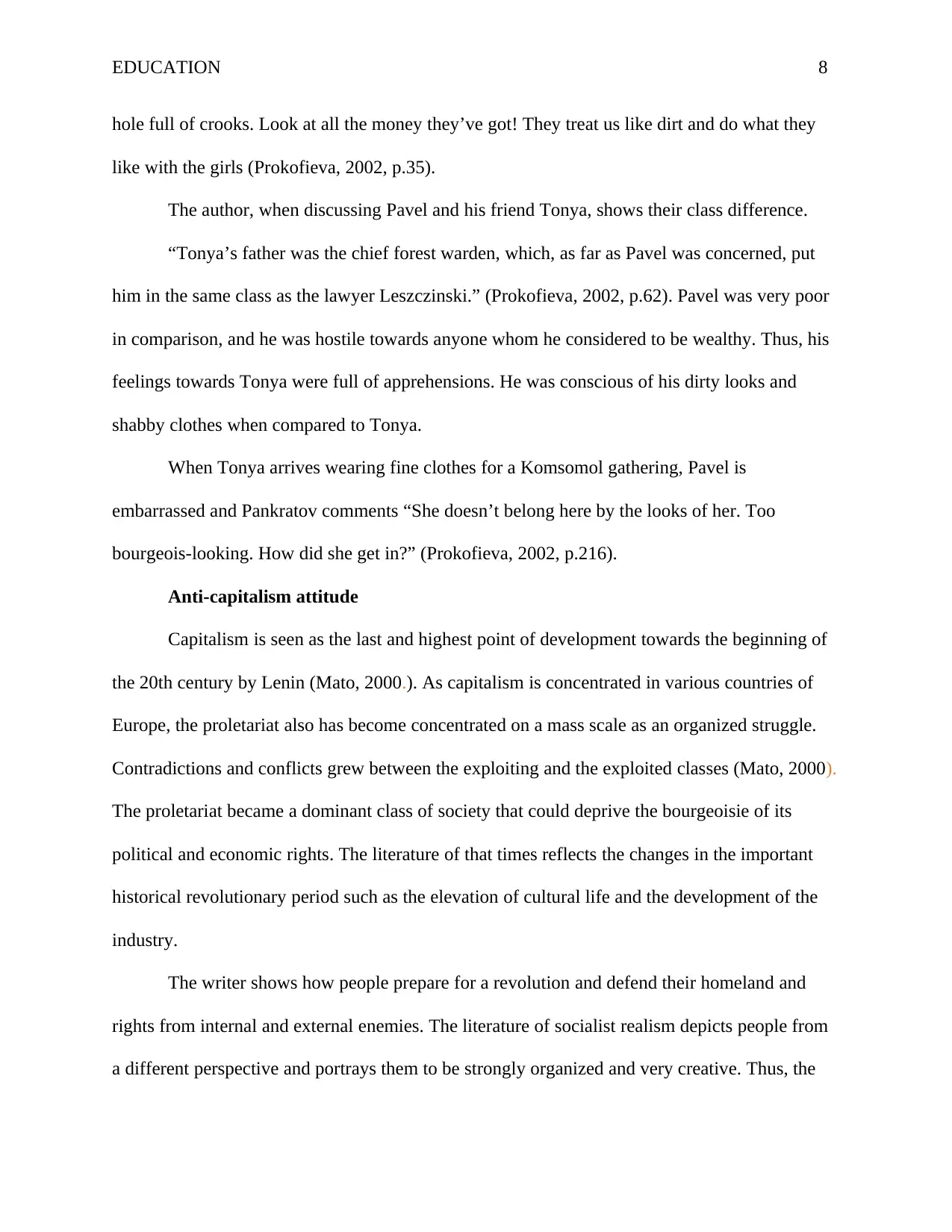
EDUCATION 8
hole full of crooks. Look at all the money they’ve got! They treat us like dirt and do what they
like with the girls (Prokofieva, 2002, p.35).
The author, when discussing Pavel and his friend Tonya, shows their class difference.
“Tonya’s father was the chief forest warden, which, as far as Pavel was concerned, put
him in the same class as the lawyer Leszczinski.” (Prokofieva, 2002, p.62). Pavel was very poor
in comparison, and he was hostile towards anyone whom he considered to be wealthy. Thus, his
feelings towards Tonya were full of apprehensions. He was conscious of his dirty looks and
shabby clothes when compared to Tonya.
When Tonya arrives wearing fine clothes for a Komsomol gathering, Pavel is
embarrassed and Pankratov comments “She doesn’t belong here by the looks of her. Too
bourgeois-looking. How did she get in?” (Prokofieva, 2002, p.216).
Anti-capitalism attitude
Capitalism is seen as the last and highest point of development towards the beginning of
the 20th century by Lenin (Mato, 2000.). As capitalism is concentrated in various countries of
Europe, the proletariat also has become concentrated on a mass scale as an organized struggle.
Contradictions and conflicts grew between the exploiting and the exploited classes (Mato, 2000).
The proletariat became a dominant class of society that could deprive the bourgeoisie of its
political and economic rights. The literature of that times reflects the changes in the important
historical revolutionary period such as the elevation of cultural life and the development of the
industry.
The writer shows how people prepare for a revolution and defend their homeland and
rights from internal and external enemies. The literature of socialist realism depicts people from
a different perspective and portrays them to be strongly organized and very creative. Thus, the
hole full of crooks. Look at all the money they’ve got! They treat us like dirt and do what they
like with the girls (Prokofieva, 2002, p.35).
The author, when discussing Pavel and his friend Tonya, shows their class difference.
“Tonya’s father was the chief forest warden, which, as far as Pavel was concerned, put
him in the same class as the lawyer Leszczinski.” (Prokofieva, 2002, p.62). Pavel was very poor
in comparison, and he was hostile towards anyone whom he considered to be wealthy. Thus, his
feelings towards Tonya were full of apprehensions. He was conscious of his dirty looks and
shabby clothes when compared to Tonya.
When Tonya arrives wearing fine clothes for a Komsomol gathering, Pavel is
embarrassed and Pankratov comments “She doesn’t belong here by the looks of her. Too
bourgeois-looking. How did she get in?” (Prokofieva, 2002, p.216).
Anti-capitalism attitude
Capitalism is seen as the last and highest point of development towards the beginning of
the 20th century by Lenin (Mato, 2000.). As capitalism is concentrated in various countries of
Europe, the proletariat also has become concentrated on a mass scale as an organized struggle.
Contradictions and conflicts grew between the exploiting and the exploited classes (Mato, 2000).
The proletariat became a dominant class of society that could deprive the bourgeoisie of its
political and economic rights. The literature of that times reflects the changes in the important
historical revolutionary period such as the elevation of cultural life and the development of the
industry.
The writer shows how people prepare for a revolution and defend their homeland and
rights from internal and external enemies. The literature of socialist realism depicts people from
a different perspective and portrays them to be strongly organized and very creative. Thus, the
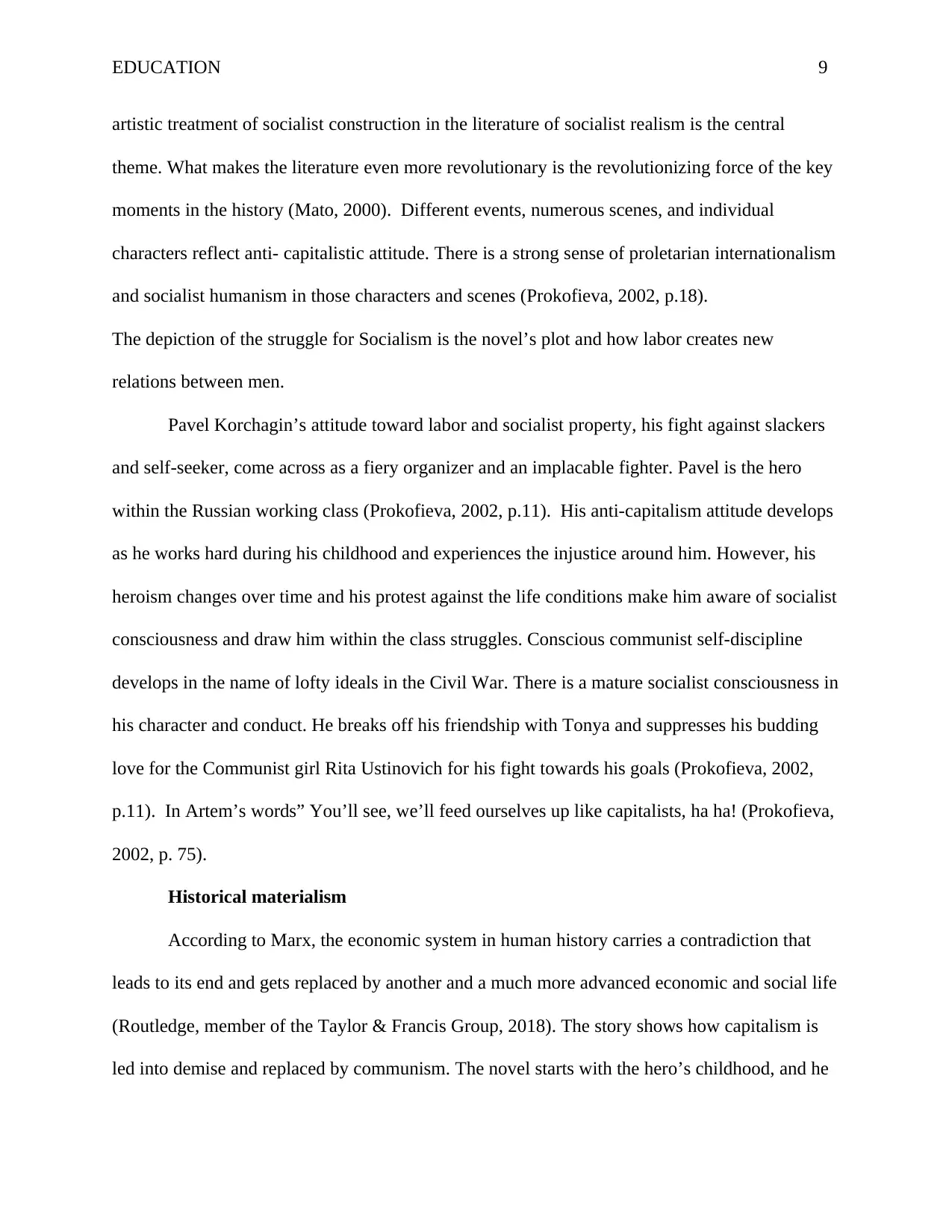
EDUCATION 9
artistic treatment of socialist construction in the literature of socialist realism is the central
theme. What makes the literature even more revolutionary is the revolutionizing force of the key
moments in the history (Mato, 2000). Different events, numerous scenes, and individual
characters reflect anti- capitalistic attitude. There is a strong sense of proletarian internationalism
and socialist humanism in those characters and scenes (Prokofieva, 2002, p.18).
The depiction of the struggle for Socialism is the novel’s plot and how labor creates new
relations between men.
Pavel Korchagin’s attitude toward labor and socialist property, his fight against slackers
and self-seeker, come across as a fiery organizer and an implacable fighter. Pavel is the hero
within the Russian working class (Prokofieva, 2002, p.11). His anti-capitalism attitude develops
as he works hard during his childhood and experiences the injustice around him. However, his
heroism changes over time and his protest against the life conditions make him aware of socialist
consciousness and draw him within the class struggles. Conscious communist self-discipline
develops in the name of lofty ideals in the Civil War. There is a mature socialist consciousness in
his character and conduct. He breaks off his friendship with Tonya and suppresses his budding
love for the Communist girl Rita Ustinovich for his fight towards his goals (Prokofieva, 2002,
p.11). In Artem’s words” You’ll see, we’ll feed ourselves up like capitalists, ha ha! (Prokofieva,
2002, p. 75).
Historical materialism
According to Marx, the economic system in human history carries a contradiction that
leads to its end and gets replaced by another and a much more advanced economic and social life
(Routledge, member of the Taylor & Francis Group, 2018). The story shows how capitalism is
led into demise and replaced by communism. The novel starts with the hero’s childhood, and he
artistic treatment of socialist construction in the literature of socialist realism is the central
theme. What makes the literature even more revolutionary is the revolutionizing force of the key
moments in the history (Mato, 2000). Different events, numerous scenes, and individual
characters reflect anti- capitalistic attitude. There is a strong sense of proletarian internationalism
and socialist humanism in those characters and scenes (Prokofieva, 2002, p.18).
The depiction of the struggle for Socialism is the novel’s plot and how labor creates new
relations between men.
Pavel Korchagin’s attitude toward labor and socialist property, his fight against slackers
and self-seeker, come across as a fiery organizer and an implacable fighter. Pavel is the hero
within the Russian working class (Prokofieva, 2002, p.11). His anti-capitalism attitude develops
as he works hard during his childhood and experiences the injustice around him. However, his
heroism changes over time and his protest against the life conditions make him aware of socialist
consciousness and draw him within the class struggles. Conscious communist self-discipline
develops in the name of lofty ideals in the Civil War. There is a mature socialist consciousness in
his character and conduct. He breaks off his friendship with Tonya and suppresses his budding
love for the Communist girl Rita Ustinovich for his fight towards his goals (Prokofieva, 2002,
p.11). In Artem’s words” You’ll see, we’ll feed ourselves up like capitalists, ha ha! (Prokofieva,
2002, p. 75).
Historical materialism
According to Marx, the economic system in human history carries a contradiction that
leads to its end and gets replaced by another and a much more advanced economic and social life
(Routledge, member of the Taylor & Francis Group, 2018). The story shows how capitalism is
led into demise and replaced by communism. The novel starts with the hero’s childhood, and he
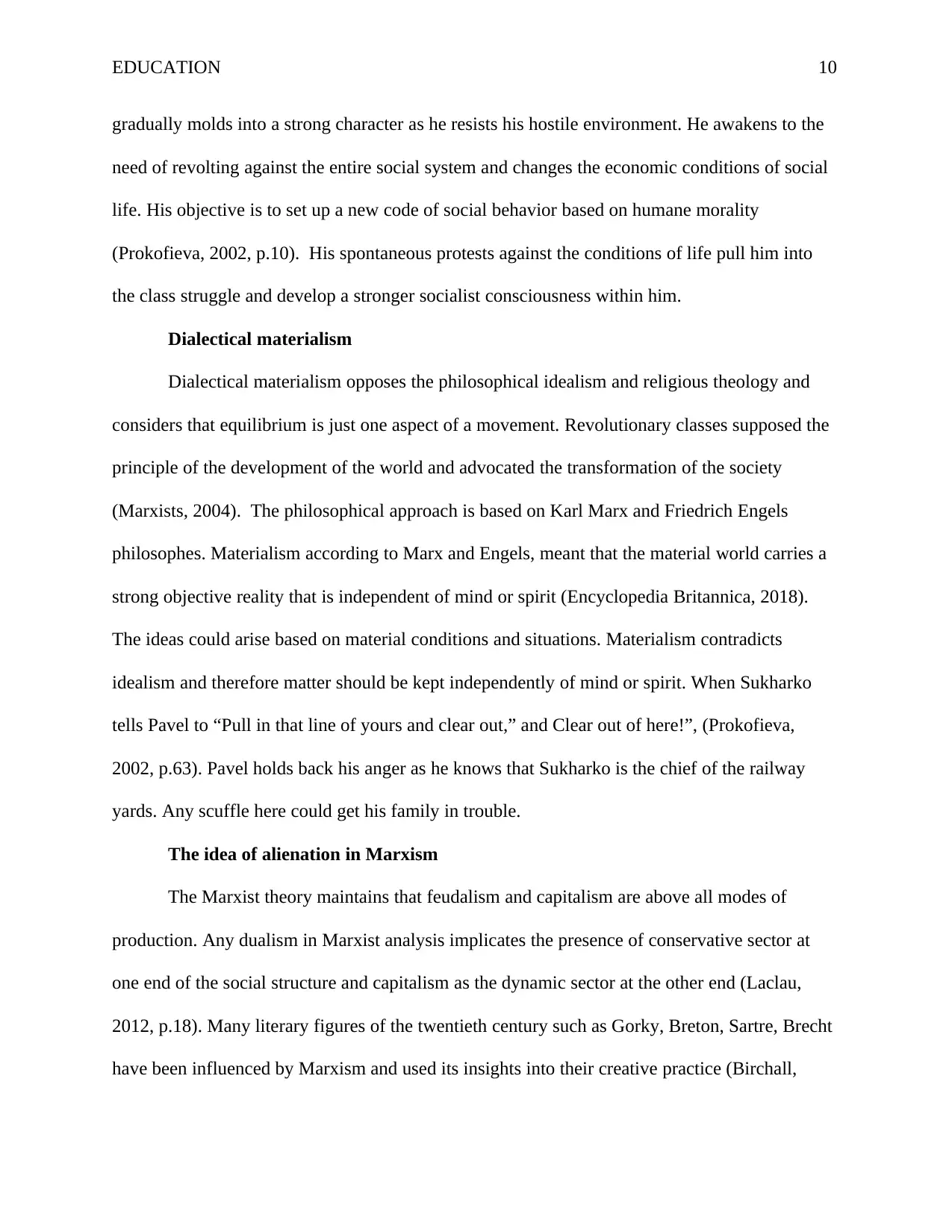
EDUCATION 10
gradually molds into a strong character as he resists his hostile environment. He awakens to the
need of revolting against the entire social system and changes the economic conditions of social
life. His objective is to set up a new code of social behavior based on humane morality
(Prokofieva, 2002, p.10). His spontaneous protests against the conditions of life pull him into
the class struggle and develop a stronger socialist consciousness within him.
Dialectical materialism
Dialectical materialism opposes the philosophical idealism and religious theology and
considers that equilibrium is just one aspect of a movement. Revolutionary classes supposed the
principle of the development of the world and advocated the transformation of the society
(Marxists, 2004). The philosophical approach is based on Karl Marx and Friedrich Engels
philosophes. Materialism according to Marx and Engels, meant that the material world carries a
strong objective reality that is independent of mind or spirit (Encyclopedia Britannica, 2018).
The ideas could arise based on material conditions and situations. Materialism contradicts
idealism and therefore matter should be kept independently of mind or spirit. When Sukharko
tells Pavel to “Pull in that line of yours and clear out,” and Clear out of here!”, (Prokofieva,
2002, p.63). Pavel holds back his anger as he knows that Sukharko is the chief of the railway
yards. Any scuffle here could get his family in trouble.
The idea of alienation in Marxism
The Marxist theory maintains that feudalism and capitalism are above all modes of
production. Any dualism in Marxist analysis implicates the presence of conservative sector at
one end of the social structure and capitalism as the dynamic sector at the other end (Laclau,
2012, p.18). Many literary figures of the twentieth century such as Gorky, Breton, Sartre, Brecht
have been influenced by Marxism and used its insights into their creative practice (Birchall,
gradually molds into a strong character as he resists his hostile environment. He awakens to the
need of revolting against the entire social system and changes the economic conditions of social
life. His objective is to set up a new code of social behavior based on humane morality
(Prokofieva, 2002, p.10). His spontaneous protests against the conditions of life pull him into
the class struggle and develop a stronger socialist consciousness within him.
Dialectical materialism
Dialectical materialism opposes the philosophical idealism and religious theology and
considers that equilibrium is just one aspect of a movement. Revolutionary classes supposed the
principle of the development of the world and advocated the transformation of the society
(Marxists, 2004). The philosophical approach is based on Karl Marx and Friedrich Engels
philosophes. Materialism according to Marx and Engels, meant that the material world carries a
strong objective reality that is independent of mind or spirit (Encyclopedia Britannica, 2018).
The ideas could arise based on material conditions and situations. Materialism contradicts
idealism and therefore matter should be kept independently of mind or spirit. When Sukharko
tells Pavel to “Pull in that line of yours and clear out,” and Clear out of here!”, (Prokofieva,
2002, p.63). Pavel holds back his anger as he knows that Sukharko is the chief of the railway
yards. Any scuffle here could get his family in trouble.
The idea of alienation in Marxism
The Marxist theory maintains that feudalism and capitalism are above all modes of
production. Any dualism in Marxist analysis implicates the presence of conservative sector at
one end of the social structure and capitalism as the dynamic sector at the other end (Laclau,
2012, p.18). Many literary figures of the twentieth century such as Gorky, Breton, Sartre, Brecht
have been influenced by Marxism and used its insights into their creative practice (Birchall,
Secure Best Marks with AI Grader
Need help grading? Try our AI Grader for instant feedback on your assignments.
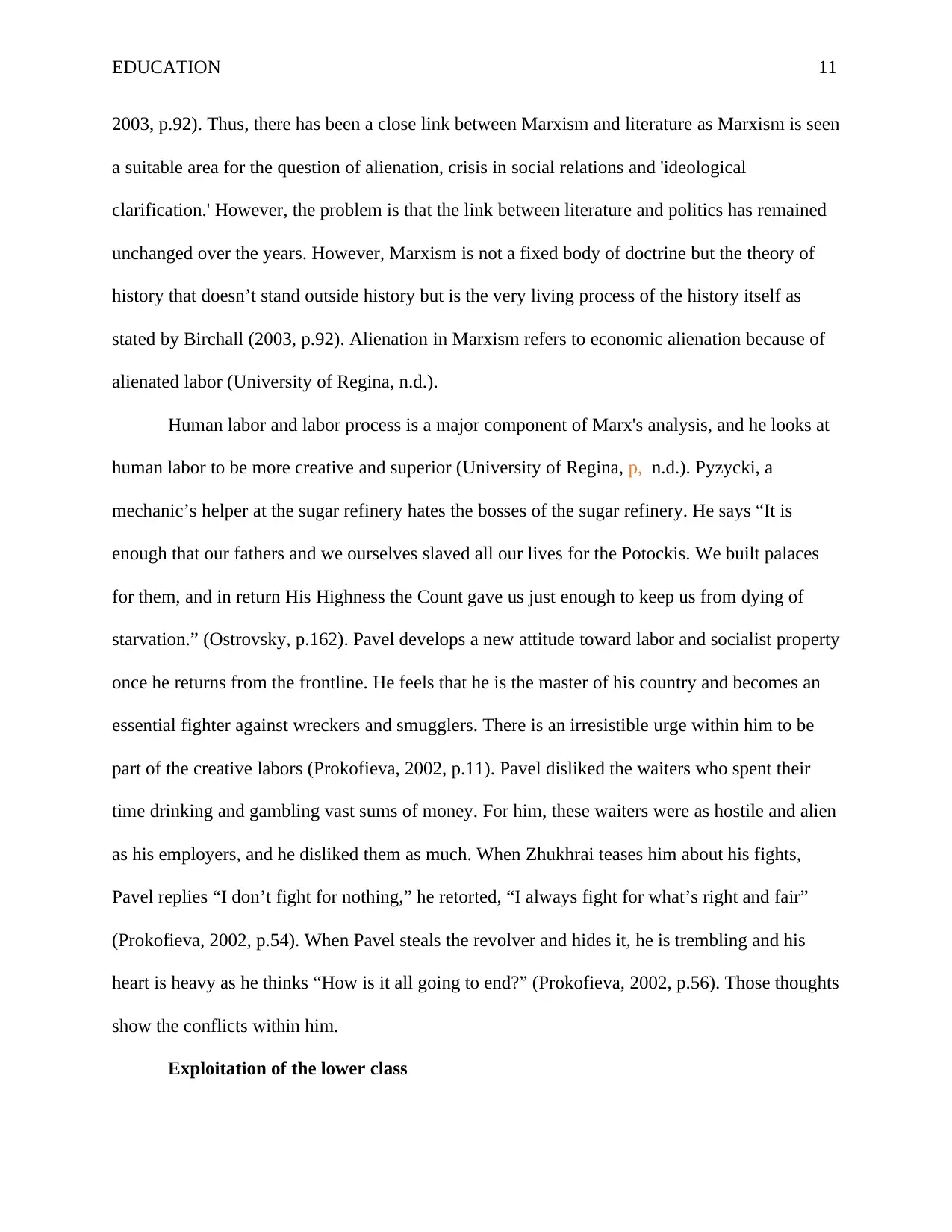
EDUCATION 11
2003, p.92). Thus, there has been a close link between Marxism and literature as Marxism is seen
a suitable area for the question of alienation, crisis in social relations and 'ideological
clarification.' However, the problem is that the link between literature and politics has remained
unchanged over the years. However, Marxism is not a fixed body of doctrine but the theory of
history that doesn’t stand outside history but is the very living process of the history itself as
stated by Birchall (2003, p.92). Alienation in Marxism refers to economic alienation because of
alienated labor (University of Regina, n.d.).
Human labor and labor process is a major component of Marx's analysis, and he looks at
human labor to be more creative and superior (University of Regina, p, n.d.). Pyzycki, a
mechanic’s helper at the sugar refinery hates the bosses of the sugar refinery. He says “It is
enough that our fathers and we ourselves slaved all our lives for the Potockis. We built palaces
for them, and in return His Highness the Count gave us just enough to keep us from dying of
starvation.” (Ostrovsky, p.162). Pavel develops a new attitude toward labor and socialist property
once he returns from the frontline. He feels that he is the master of his country and becomes an
essential fighter against wreckers and smugglers. There is an irresistible urge within him to be
part of the creative labors (Prokofieva, 2002, p.11). Pavel disliked the waiters who spent their
time drinking and gambling vast sums of money. For him, these waiters were as hostile and alien
as his employers, and he disliked them as much. When Zhukhrai teases him about his fights,
Pavel replies “I don’t fight for nothing,” he retorted, “I always fight for what’s right and fair”
(Prokofieva, 2002, p.54). When Pavel steals the revolver and hides it, he is trembling and his
heart is heavy as he thinks “How is it all going to end?” (Prokofieva, 2002, p.56). Those thoughts
show the conflicts within him.
Exploitation of the lower class
2003, p.92). Thus, there has been a close link between Marxism and literature as Marxism is seen
a suitable area for the question of alienation, crisis in social relations and 'ideological
clarification.' However, the problem is that the link between literature and politics has remained
unchanged over the years. However, Marxism is not a fixed body of doctrine but the theory of
history that doesn’t stand outside history but is the very living process of the history itself as
stated by Birchall (2003, p.92). Alienation in Marxism refers to economic alienation because of
alienated labor (University of Regina, n.d.).
Human labor and labor process is a major component of Marx's analysis, and he looks at
human labor to be more creative and superior (University of Regina, p, n.d.). Pyzycki, a
mechanic’s helper at the sugar refinery hates the bosses of the sugar refinery. He says “It is
enough that our fathers and we ourselves slaved all our lives for the Potockis. We built palaces
for them, and in return His Highness the Count gave us just enough to keep us from dying of
starvation.” (Ostrovsky, p.162). Pavel develops a new attitude toward labor and socialist property
once he returns from the frontline. He feels that he is the master of his country and becomes an
essential fighter against wreckers and smugglers. There is an irresistible urge within him to be
part of the creative labors (Prokofieva, 2002, p.11). Pavel disliked the waiters who spent their
time drinking and gambling vast sums of money. For him, these waiters were as hostile and alien
as his employers, and he disliked them as much. When Zhukhrai teases him about his fights,
Pavel replies “I don’t fight for nothing,” he retorted, “I always fight for what’s right and fair”
(Prokofieva, 2002, p.54). When Pavel steals the revolver and hides it, he is trembling and his
heart is heavy as he thinks “How is it all going to end?” (Prokofieva, 2002, p.56). Those thoughts
show the conflicts within him.
Exploitation of the lower class
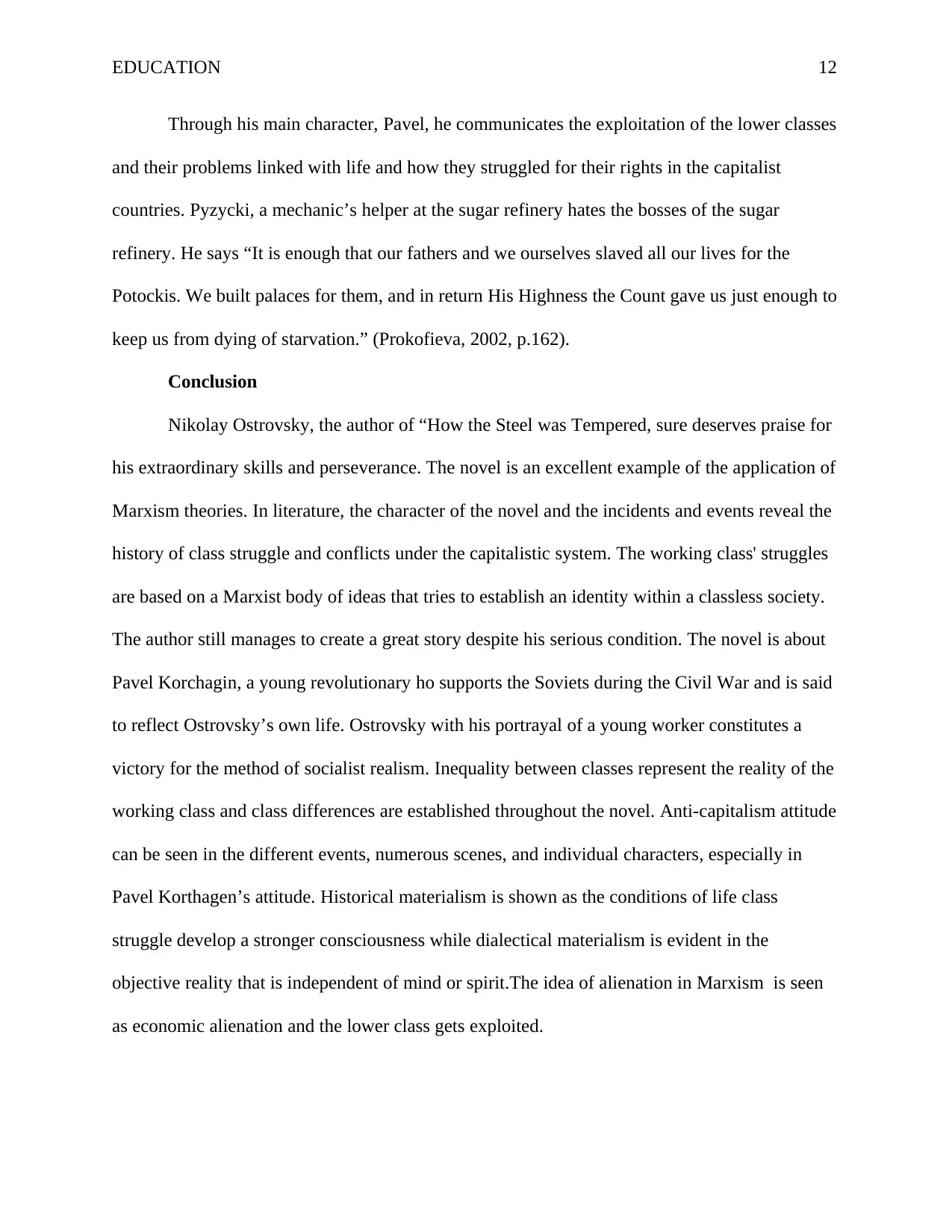
EDUCATION 12
Through his main character, Pavel, he communicates the exploitation of the lower classes
and their problems linked with life and how they struggled for their rights in the capitalist
countries. Pyzycki, a mechanic’s helper at the sugar refinery hates the bosses of the sugar
refinery. He says “It is enough that our fathers and we ourselves slaved all our lives for the
Potockis. We built palaces for them, and in return His Highness the Count gave us just enough to
keep us from dying of starvation.” (Prokofieva, 2002, p.162).
Conclusion
Nikolay Ostrovsky, the author of “How the Steel was Tempered, sure deserves praise for
his extraordinary skills and perseverance. The novel is an excellent example of the application of
Marxism theories. In literature, the character of the novel and the incidents and events reveal the
history of class struggle and conflicts under the capitalistic system. The working class' struggles
are based on a Marxist body of ideas that tries to establish an identity within a classless society.
The author still manages to create a great story despite his serious condition. The novel is about
Pavel Korchagin, a young revolutionary ho supports the Soviets during the Civil War and is said
to reflect Ostrovsky’s own life. Ostrovsky with his portrayal of a young worker constitutes a
victory for the method of socialist realism. Inequality between classes represent the reality of the
working class and class differences are established throughout the novel. Anti-capitalism attitude
can be seen in the different events, numerous scenes, and individual characters, especially in
Pavel Korthagen’s attitude. Historical materialism is shown as the conditions of life class
struggle develop a stronger consciousness while dialectical materialism is evident in the
objective reality that is independent of mind or spirit.The idea of alienation in Marxism is seen
as economic alienation and the lower class gets exploited.
Through his main character, Pavel, he communicates the exploitation of the lower classes
and their problems linked with life and how they struggled for their rights in the capitalist
countries. Pyzycki, a mechanic’s helper at the sugar refinery hates the bosses of the sugar
refinery. He says “It is enough that our fathers and we ourselves slaved all our lives for the
Potockis. We built palaces for them, and in return His Highness the Count gave us just enough to
keep us from dying of starvation.” (Prokofieva, 2002, p.162).
Conclusion
Nikolay Ostrovsky, the author of “How the Steel was Tempered, sure deserves praise for
his extraordinary skills and perseverance. The novel is an excellent example of the application of
Marxism theories. In literature, the character of the novel and the incidents and events reveal the
history of class struggle and conflicts under the capitalistic system. The working class' struggles
are based on a Marxist body of ideas that tries to establish an identity within a classless society.
The author still manages to create a great story despite his serious condition. The novel is about
Pavel Korchagin, a young revolutionary ho supports the Soviets during the Civil War and is said
to reflect Ostrovsky’s own life. Ostrovsky with his portrayal of a young worker constitutes a
victory for the method of socialist realism. Inequality between classes represent the reality of the
working class and class differences are established throughout the novel. Anti-capitalism attitude
can be seen in the different events, numerous scenes, and individual characters, especially in
Pavel Korthagen’s attitude. Historical materialism is shown as the conditions of life class
struggle develop a stronger consciousness while dialectical materialism is evident in the
objective reality that is independent of mind or spirit.The idea of alienation in Marxism is seen
as economic alienation and the lower class gets exploited.
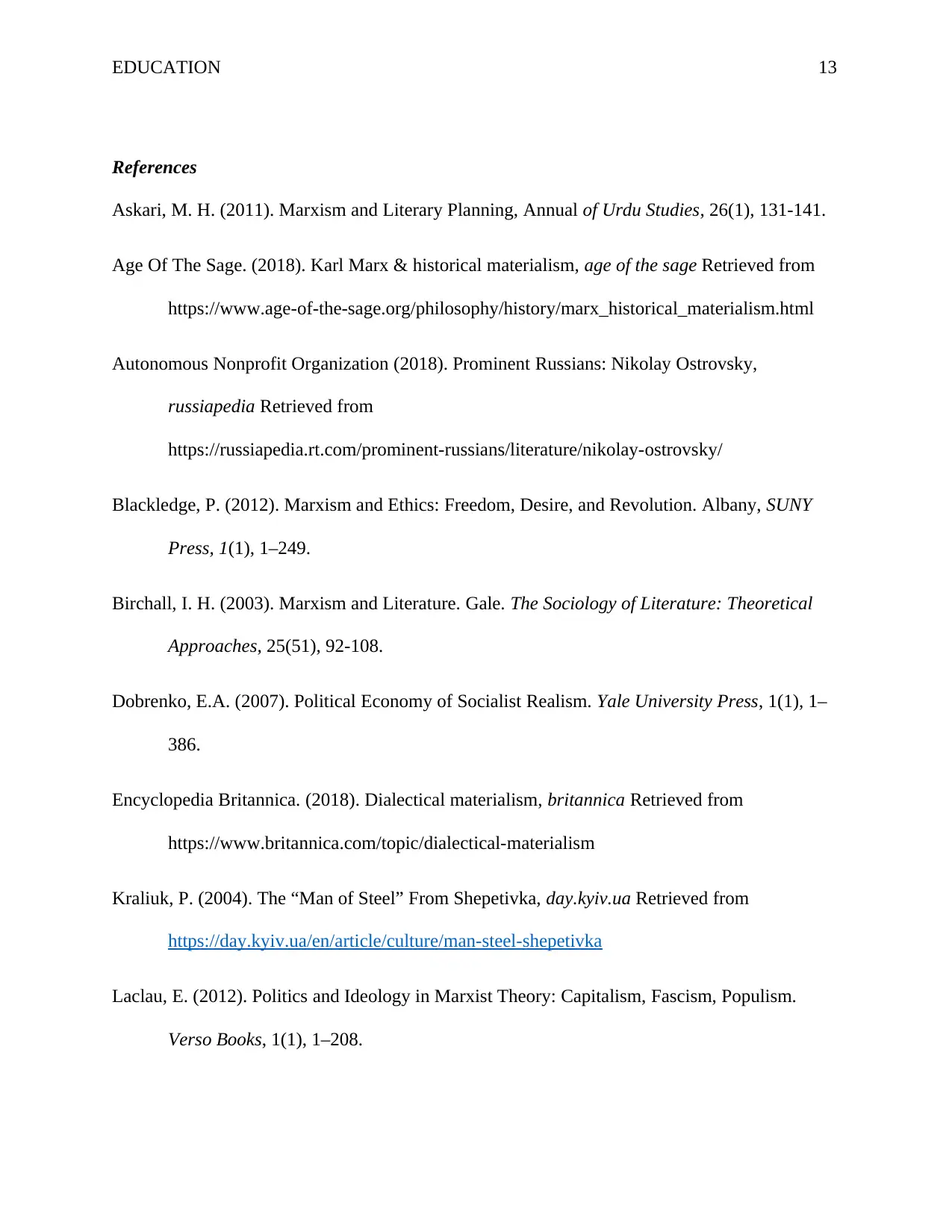
EDUCATION 13
References
Askari, M. H. (2011). Marxism and Literary Planning, Annual of Urdu Studies, 26(1), 131-141.
Age Of The Sage. (2018). Karl Marx & historical materialism, age of the sage Retrieved from
https://www.age-of-the-sage.org/philosophy/history/marx_historical_materialism.html
Autonomous Nonprofit Organization (2018). Prominent Russians: Nikolay Ostrovsky,
russiapedia Retrieved from
https://russiapedia.rt.com/prominent-russians/literature/nikolay-ostrovsky/
Blackledge, P. (2012). Marxism and Ethics: Freedom, Desire, and Revolution. Albany, SUNY
Press, 1(1), 1–249.
Birchall, I. H. (2003). Marxism and Literature. Gale. The Sociology of Literature: Theoretical
Approaches, 25(51), 92-108.
Dobrenko, E.A. (2007). Political Economy of Socialist Realism. Yale University Press, 1(1), 1–
386.
Encyclopedia Britannica. (2018). Dialectical materialism, britannica Retrieved from
https://www.britannica.com/topic/dialectical-materialism
Kraliuk, P. (2004). The “Man of Steel” From Shepetivka, day.kyiv.ua Retrieved from
https://day.kyiv.ua/en/article/culture/man-steel-shepetivka
Laclau, E. (2012). Politics and Ideology in Marxist Theory: Capitalism, Fascism, Populism.
Verso Books, 1(1), 1–208.
References
Askari, M. H. (2011). Marxism and Literary Planning, Annual of Urdu Studies, 26(1), 131-141.
Age Of The Sage. (2018). Karl Marx & historical materialism, age of the sage Retrieved from
https://www.age-of-the-sage.org/philosophy/history/marx_historical_materialism.html
Autonomous Nonprofit Organization (2018). Prominent Russians: Nikolay Ostrovsky,
russiapedia Retrieved from
https://russiapedia.rt.com/prominent-russians/literature/nikolay-ostrovsky/
Blackledge, P. (2012). Marxism and Ethics: Freedom, Desire, and Revolution. Albany, SUNY
Press, 1(1), 1–249.
Birchall, I. H. (2003). Marxism and Literature. Gale. The Sociology of Literature: Theoretical
Approaches, 25(51), 92-108.
Dobrenko, E.A. (2007). Political Economy of Socialist Realism. Yale University Press, 1(1), 1–
386.
Encyclopedia Britannica. (2018). Dialectical materialism, britannica Retrieved from
https://www.britannica.com/topic/dialectical-materialism
Kraliuk, P. (2004). The “Man of Steel” From Shepetivka, day.kyiv.ua Retrieved from
https://day.kyiv.ua/en/article/culture/man-steel-shepetivka
Laclau, E. (2012). Politics and Ideology in Marxist Theory: Capitalism, Fascism, Populism.
Verso Books, 1(1), 1–208.
Paraphrase This Document
Need a fresh take? Get an instant paraphrase of this document with our AI Paraphraser
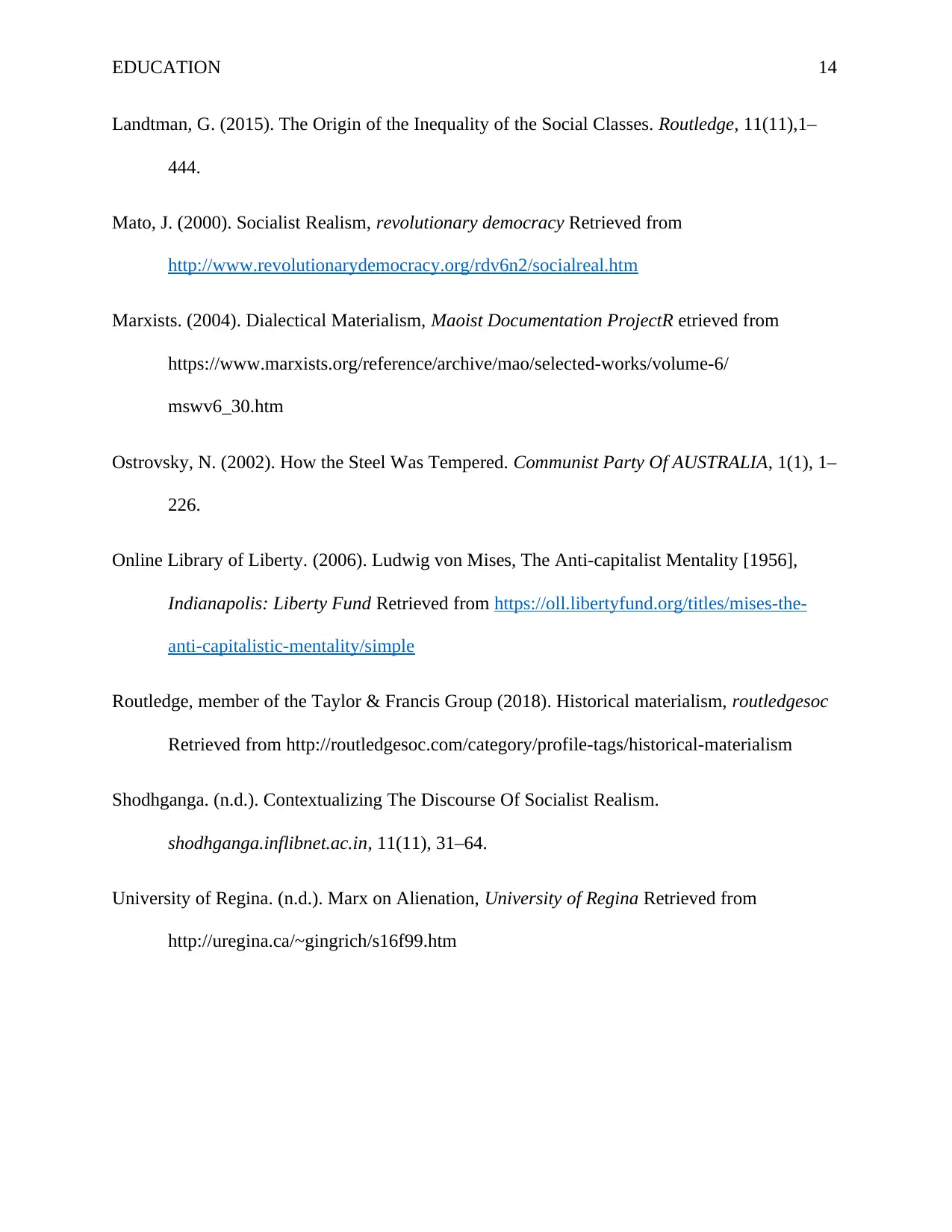
EDUCATION 14
Landtman, G. (2015). The Origin of the Inequality of the Social Classes. Routledge, 11(11),1–
444.
Mato, J. (2000). Socialist Realism, revolutionary democracy Retrieved from
http://www.revolutionarydemocracy.org/rdv6n2/socialreal.htm
Marxists. (2004). Dialectical Materialism, Maoist Documentation ProjectR etrieved from
https://www.marxists.org/reference/archive/mao/selected-works/volume-6/
mswv6_30.htm
Ostrovsky, N. (2002). How the Steel Was Tempered. Communist Party Of AUSTRALIA, 1(1), 1–
226.
Online Library of Liberty. (2006). Ludwig von Mises, The Anti-capitalist Mentality [1956],
Indianapolis: Liberty Fund Retrieved from https://oll.libertyfund.org/titles/mises-the-
anti-capitalistic-mentality/simple
Routledge, member of the Taylor & Francis Group (2018). Historical materialism, routledgesoc
Retrieved from http://routledgesoc.com/category/profile-tags/historical-materialism
Shodhganga. (n.d.). Contextualizing The Discourse Of Socialist Realism.
shodhganga.inflibnet.ac.in, 11(11), 31–64.
University of Regina. (n.d.). Marx on Alienation, University of Regina Retrieved from
http://uregina.ca/~gingrich/s16f99.htm
Landtman, G. (2015). The Origin of the Inequality of the Social Classes. Routledge, 11(11),1–
444.
Mato, J. (2000). Socialist Realism, revolutionary democracy Retrieved from
http://www.revolutionarydemocracy.org/rdv6n2/socialreal.htm
Marxists. (2004). Dialectical Materialism, Maoist Documentation ProjectR etrieved from
https://www.marxists.org/reference/archive/mao/selected-works/volume-6/
mswv6_30.htm
Ostrovsky, N. (2002). How the Steel Was Tempered. Communist Party Of AUSTRALIA, 1(1), 1–
226.
Online Library of Liberty. (2006). Ludwig von Mises, The Anti-capitalist Mentality [1956],
Indianapolis: Liberty Fund Retrieved from https://oll.libertyfund.org/titles/mises-the-
anti-capitalistic-mentality/simple
Routledge, member of the Taylor & Francis Group (2018). Historical materialism, routledgesoc
Retrieved from http://routledgesoc.com/category/profile-tags/historical-materialism
Shodhganga. (n.d.). Contextualizing The Discourse Of Socialist Realism.
shodhganga.inflibnet.ac.in, 11(11), 31–64.
University of Regina. (n.d.). Marx on Alienation, University of Regina Retrieved from
http://uregina.ca/~gingrich/s16f99.htm
1 out of 14
Your All-in-One AI-Powered Toolkit for Academic Success.
+13062052269
info@desklib.com
Available 24*7 on WhatsApp / Email
![[object Object]](/_next/static/media/star-bottom.7253800d.svg)
Unlock your academic potential
© 2024 | Zucol Services PVT LTD | All rights reserved.